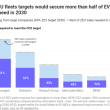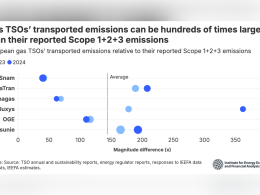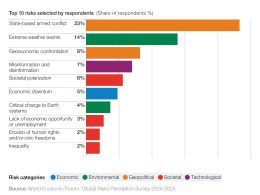New data from CDP, the independent environmental disclosure system, highlights an urgent need for climate finance to support urban infrastructure projects worldwide as cities take a leading role in climate action.
The 2024 Global Snapshot, produced in partnership with the Global Covenant of Mayors for Climate & Energy (GCoM), reveals that 611 cities across 75 countries have disclosed 2,508 climate-related projects through CDP-ICLEI Track in 2024, requiring a total investment of $86 billion. The demand for climate finance in cities continues to rise, with reported investment needs increasing by 23% this year. However, this figure remains a fraction of the $800 billion in annual public investment needed from national governments and development finance institutions by 2030, as highlighted at last year’s U20 summit.
Despite progress, climate finance for cities remains severely inadequate. While investment flows more than doubled between 2017 and 2022, they are still far short of the estimated $4.5 trillion needed annually through 2030 to support climate mitigation and adaptation efforts. Currently, 86% of reported urban climate projects are actively seeking funding, with 40% of projects in emerging markets and developing economies (EMDEs) lacking full financing.
The top three sectors requiring investment in 2024 are water management, which includes 272 projects amounting to $28 billion; transport, with 397 projects requiring $19 billion; and buildings and energy efficiency, covering 508 projects with a total investment need of $12 billion.
Developed economies continue to report the highest number of projects, with Europe, North America, and Latin America leading in submissions. However, cities in EMDEs account for just 27% of total reported financing needs, underscoring the urgent need for increased international support to strengthen climate resilience in vulnerable urban areas.
While cities are making significant strides in tackling the climate crisis, greater financial support is needed—particularly in emerging markets. CDP and its partners have called for increased local climate finance, with a target of mobilising at least $800 billion annually in public investment by 2030 to meet the $4.5 trillion funding gap for city climate projects. They also emphasise the importance of private sector engagement by creating investment-friendly conditions, working with public financial institutions, and scaling up finance to mitigate greenhouse gas emissions and climate risks in cities. Furthermore, aligning national and local strategies is essential to ensure that Nationally Determined Contributions (NDCs) reflect local investment needs for accessible and effective urban climate finance.
Robust and detailed data on cities’ climate projects and investment needs is essential to the success of initiatives like the Coalition for High Ambition Multilevel Partnerships (CHAMP) for climate action. With over 75% of projects, or 1,929, reported by cities in CHAMP-endorsing countries, the CDP-ICLEI Track data can help national governments align their NDC investment strategies, better understand local priorities, and scale up city-led climate action.
As cities face more frequent extreme weather events and strive to reduce their environmental impact, transparent data disclosure will be crucial in unlocking investment and accelerating meaningful climate action.
Katie Walsh, CDP’s Head of Climate Finance for Cities, States, & Regions, stressed the urgency of addressing the climate finance gap, stating that cities are leading the charge against climate change, but without urgent and substantial investment, their efforts will be hindered. She noted that the 23% rise in reported investment needs reflects the growing scale of urban climate action, yet the funding gap remains a critical barrier.
She further emphasised that to make meaningful progress, it is essential to empower local governments, especially in developing economies, with the financial support they need. She called for scaling up climate finance, fostering stronger cross-sector collaboration, and making Earth-positive decisions that will build resilient cities and ensure a sustainable future for all.
Asma Jhina, Senior Advisor for Urban Climate Finance and Inclusive Action at GCoM, echoed the call for increased financial support, stating that cities worldwide are stepping up to lead in climate action and advancing critical urban infrastructure projects to build resilient communities. However, she highlighted that they require access to funding and partnerships to implement these projects effectively, with the latest CDP Global Snapshot reinforcing the urgent need for climate finance to support urban infrastructure projects globally.


















